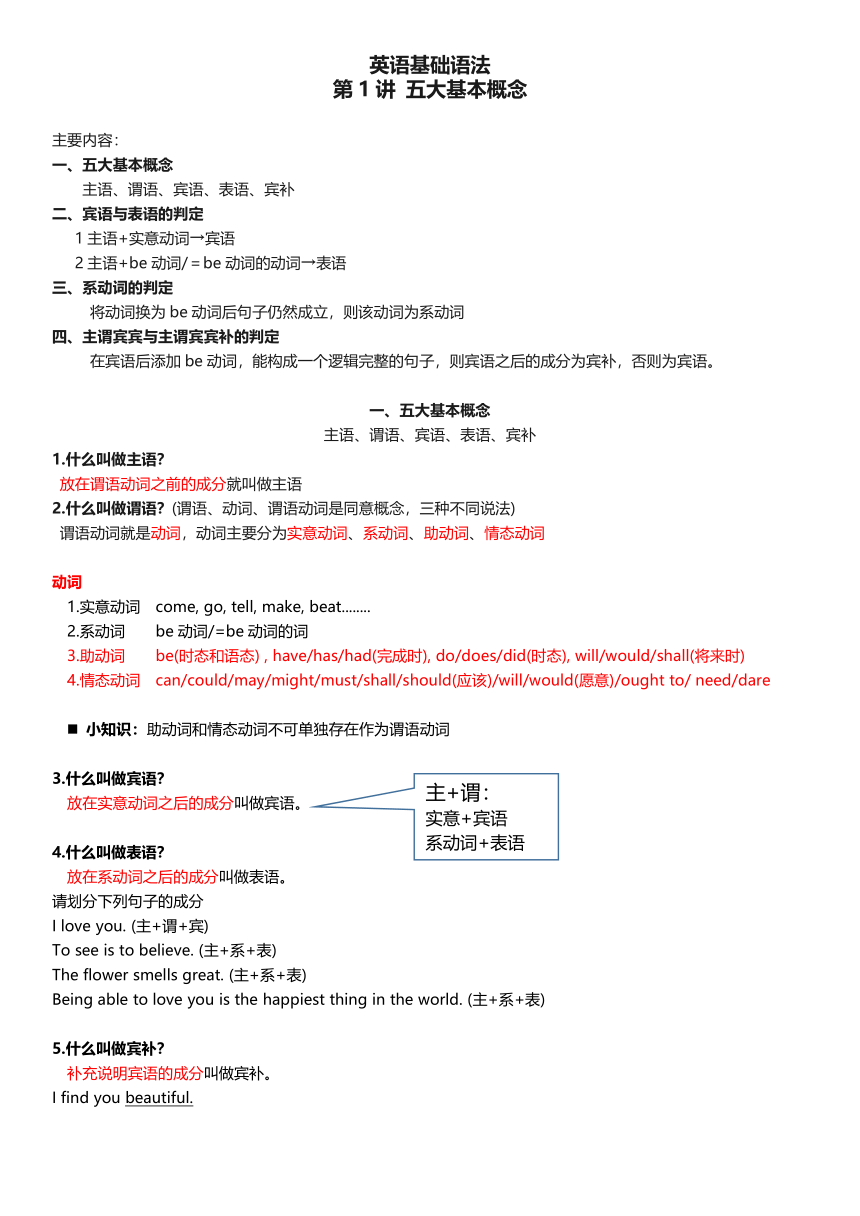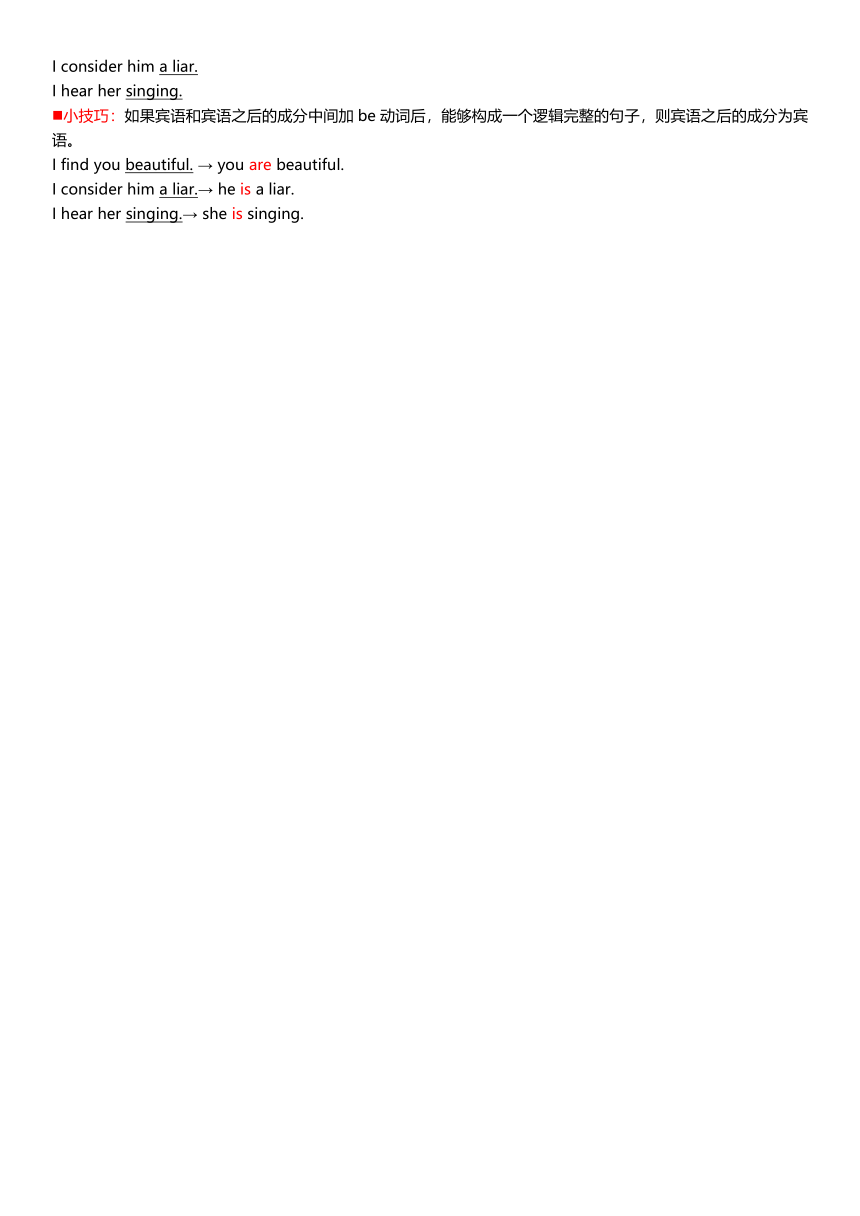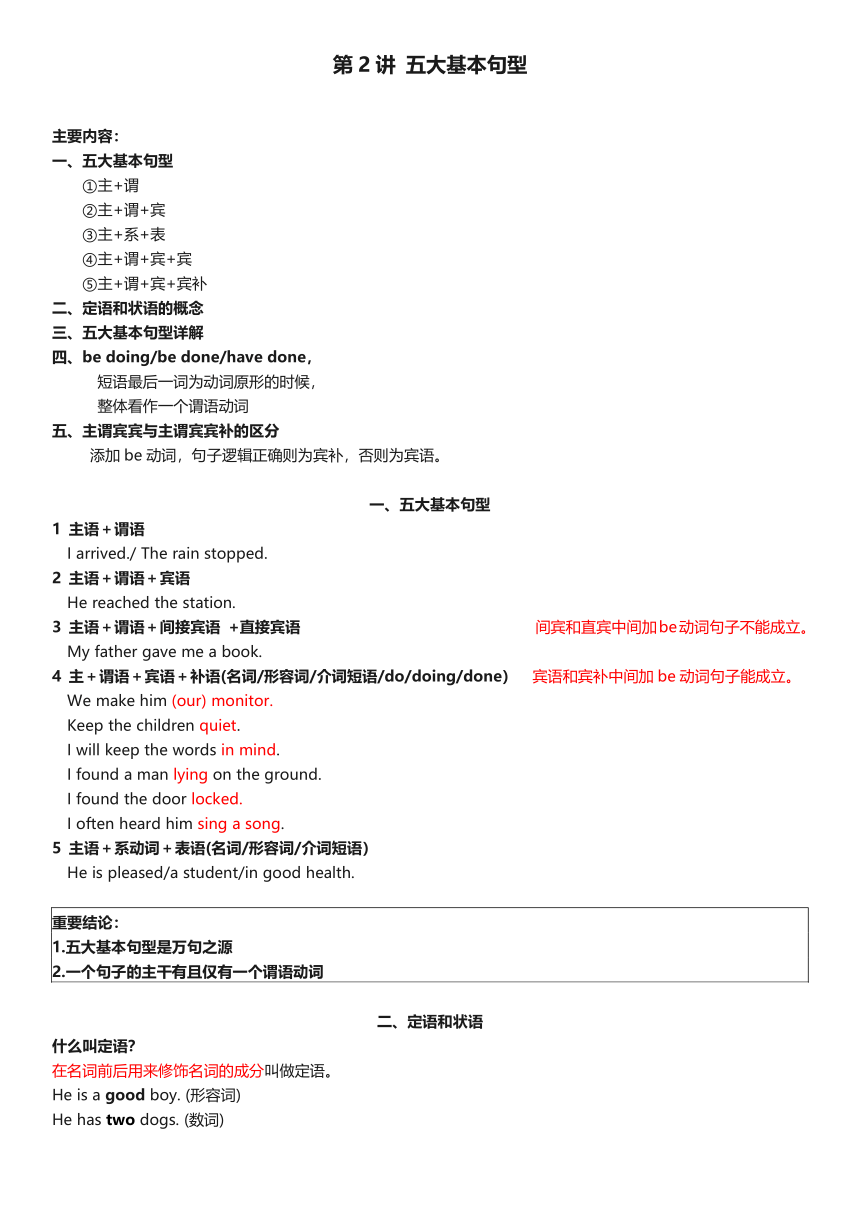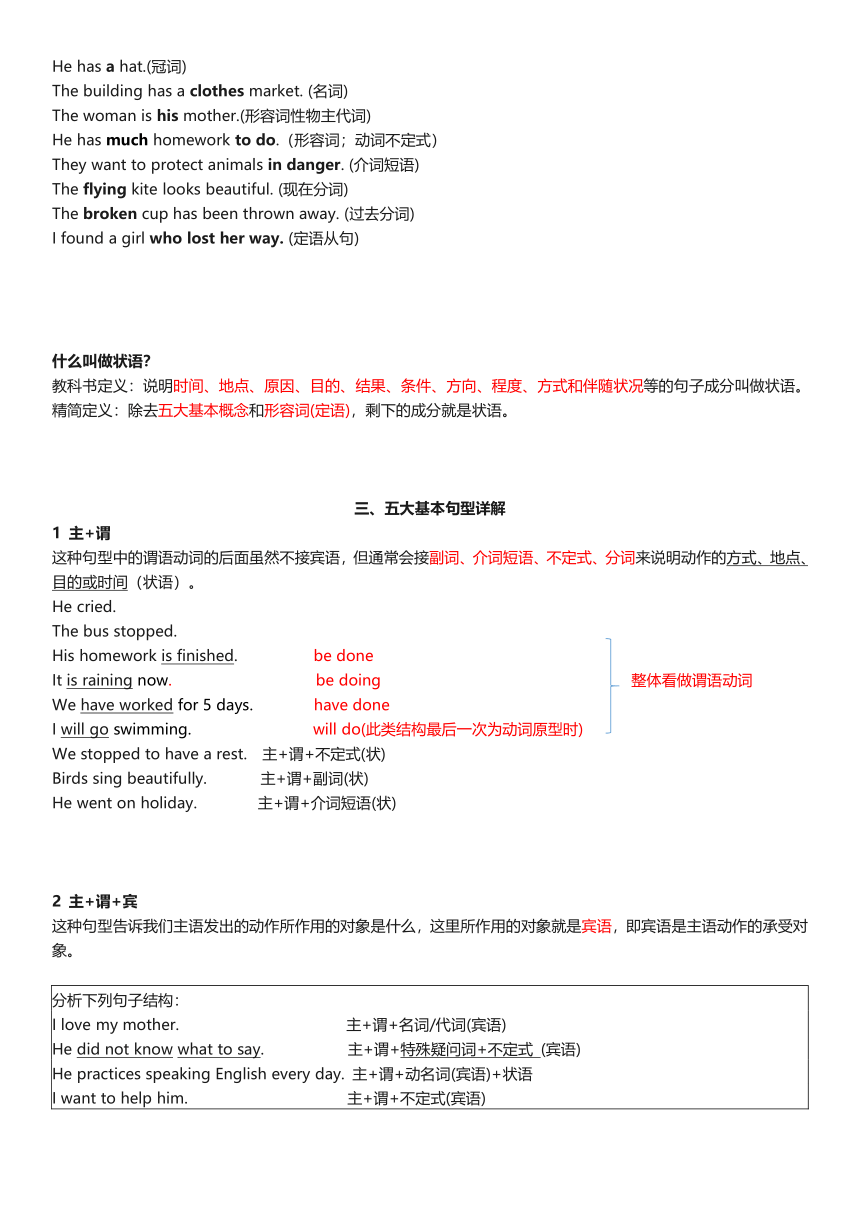2021年中考英语句子成分和五大基本句型(一)及练习(含答案)
文档属性
| 名称 | 2021年中考英语句子成分和五大基本句型(一)及练习(含答案) |  | |
| 格式 | zip | ||
| 文件大小 | 41.8KB | ||
| 资源类型 | 教案 | ||
| 版本资源 | 通用版 | ||
| 科目 | 英语 | ||
| 更新时间 | 2020-09-16 22:01:36 | ||
图片预览




文档简介
英语基础语法
第1讲
五大基本概念
主要内容:
一、五大基本概念
主语、谓语、宾语、表语、宾补
二、宾语与表语的判定
1主语+实意动词→宾语
2主语+be动词/=be动词的动词→表语
三、系动词的判定
将动词换为be动词后句子仍然成立,则该动词为系动词
四、主谓宾宾与主谓宾宾补的判定
在宾语后添加be动词,能构成一个逻辑完整的句子,则宾语之后的成分为宾补,否则为宾语。
一、五大基本概念
主语、谓语、宾语、表语、宾补
1.什么叫做主语?
放在谓语动词之前的成分就叫做主语
2.什么叫做谓语?(谓语、动词、谓语动词是同意概念,三种不同说法)
谓语动词就是动词,动词主要分为实意动词、系动词、助动词、情态动词
动词
1.实意动词
come,
go,
tell,
make,
beat........
2.系动词
be动词/=be动词的词
3.助动词
be(时态和语态)
,
have/has/had(完成时),
do/does/did(时态),
will/would/shall(将来时)
4.情态动词
can/could/may/might/must/shall/should(应该)/will/would(愿意)/ought
to/
need/dare
小知识:助动词和情态动词不可单独存在作为谓语动词
3.什么叫做宾语?
放在实意动词之后的成分叫做宾语。
4.什么叫做表语?
放在系动词之后的成分叫做表语。
请划分下列句子的成分
I
love
you.
(主+谓+宾)
To
see
is
to
believe.
(主+系+表)
The
flower
smells
great.
(主+系+表)
Being
able
to
love
you
is
the
happiest
thing
in
the
world.
(主+系+表)
5.什么叫做宾补?
补充说明宾语的成分叫做宾补。
I
find
you
beautiful.
I
consider
him
a
liar.
I
hear
her
singing.
小技巧:如果宾语和宾语之后的成分中间加be动词后,能够构成一个逻辑完整的句子,则宾语之后的成分为宾语。
I
find
you
beautiful.
→
you
are
beautiful.
I
consider
him
a
liar.→
he
is
a
liar.
I
hear
her
singing.→
she
is
singing.
第2讲
五大基本句型
主要内容:
一、五大基本句型
①主+谓
②主+谓+宾
③主+系+表
④主+谓+宾+宾
⑤主+谓+宾+宾补
二、定语和状语的概念
三、五大基本句型详解
四、be
doing/be
done/have
done,
短语最后一词为动词原形的时候,
整体看作一个谓语动词
五、主谓宾宾与主谓宾宾补的区分
添加be动词,句子逻辑正确则为宾补,否则为宾语。
一、五大基本句型
1
主语+谓语
I
arrived./
The
rain
stopped.
2
主语+谓语+宾语
He
reached
the
station.
3
主语+谓语+间接宾语
+直接宾语
间宾和直宾中间加be动词句子不能成立。
My
father
gave
me
a
book.
4
主+谓语+宾语+补语(名词/形容词/介词短语/do/doing/done)
宾语和宾补中间加be动词句子能成立。
We
make
him
(our)
monitor.
Keep
the
children
quiet.
I
will
keep
the
words
in
mind.
I
found
a
man
lying
on
the
ground.
I
found
the
door
locked.
I
often
heard
him
sing
a
song.
5
主语+系动词+表语(名词/形容词/介词短语)
He
is
pleased/a
student/in
good
health.
重要结论:
1.五大基本句型是万句之源
2.一个句子的主干有且仅有一个谓语动词
二、定语和状语
什么叫定语?
在名词前后用来修饰名词的成分叫做定语。
He
is
a
good
boy.
(形容词)
He
has
two
dogs.
(数词)
He
has
a
hat.(冠词)
The
building
has
a
clothes
market.
(名词)
The
woman
is
his
mother.(形容词性物主代词)
He
has
much
homework
to
do.(形容词;动词不定式)
They
want
to
protect
animals
in
danger.
(介词短语)
The
flying
kite
looks
beautiful.
(现在分词)
The
broken
cup
has
been
thrown
away.
(过去分词)
I
found
a
girl
who
lost
her
way.
(定语从句)
什么叫做状语?
教科书定义:说明时间、地点、原因、目的、结果、条件、方向、程度、方式和伴随状况等的句子成分叫做状语。
精简定义:除去五大基本概念和形容词(定语),剩下的成分就是状语。
三、五大基本句型详解
1
主+谓
这种句型中的谓语动词的后面虽然不接宾语,但通常会接副词、介词短语、不定式、分词来说明动作的方式、地点、目的或时间(状语)。
He
cried.
The
bus
stopped.
His
homework
is
finished.
be
done
It
is
raining
now.
be
doing
整体看做谓语动词
We
have
worked
for
5
days.
have
done
I
will?go?swimming.
will
do(此类结构最后一次为动词原型时)
We?stopped?to
have
a
rest.
主+谓+不定式(状)
Birds?sing?beautifully.
主+谓+副词(状)
He?went?on
holiday.
主+谓+介词短语(状)
2
主+谓+宾
这种句型告诉我们主语发出的动作所作用的对象是什么,这里所作用的对象就是宾语,即宾语是主语动作的承受对象。
分析下列句子结构:
I
love
my
mother.
主+谓+名词/代词(宾语)
He
did
not
know
what
to
say.
主+谓+特殊疑问词+不定式
(宾语)
He
practices
speaking
English
every
day.
主+谓+动名词(宾语)+状语
I?want
to?help
him.
主+谓+不定式(宾语)
David?told?us
how
to
write
an
article.
主+谓+间接宾语+特殊疑问词+不定式
(直接宾语)
I
don't?think?(that)
he
is
right.
主+谓+宾语从句
3
主+谓+宾+宾补
这种句型动词后面接宾语,而此宾语的后面又接补充说明宾语的补足语。宾语和宾语补足语合起来叫做复合宾语。
(1)主语
+
谓语
+
名词/代词(宾语)
+
名词(宾补)
We?named?our
baby
Tom.
常用于这句型的动词有:appoint,
call,
choose,
elect,
entitle,
find,
make,
name,
nominate
(2)主语
+
谓语
+
名词/代词(宾语)
+
形容词(宾补)
He?painted?the
wall
white.
常用于这句型的动词有:beat,
boil,
cut,
drive,
find,
get,
hold,
keep,
leave,
like,
make,
paint,
see,
set,
turn,
want,
wash,
wipe,
wish
(3)主语
+
谓语
+
名词/代词(宾语)
+
介词短语(宾补)
She
always?keeps?everything
in
good
order.
(4)
主语
+
谓语
+
名词/代词(宾语)
+
不定式(宾补)
I?wish?you
to
stay.
(5)主语
+
谓语
+
名词/代词(宾语)
+
分词(宾补)
I?heard?my
name
called.
I?feel?something
moving.
常用于这句型的动词有:catch,
feel,
find,
get,
have,
hear,
imagine,
keep,
leave,
listen
to,
look
at,
notice,
observe,
perceive,
see,
set,
smell,
start,
watch
4
主+谓+宾+宾
该句型的谓语动词是双宾动词,这种动词的后面所接的成分有“人”又有“物”。一般来讲,这里的“人”表示动作的接受者,称作间接宾语。“物”表示动作作用的对象,是动作的承受者,称作直接宾语。间接宾语和直接宾语合起来叫双宾语。
加入be动词,逻辑正确,则为宾补;逻辑不正确,则为宾语
分析下列句子结构:
He
asked
me
to
lend
him
some
money.
主+谓+名词/代词(宾语)
+
不定式(宾补)
I
want
your
homework
done
on
time.
主+谓+名词/代词(宾语)
+
过去分词(宾补)
They
made
the
classroom
clean.
主+谓+
名词/代词(宾语)
+
形容词(宾补)
He
lent
me
some
money.
主+谓+间宾(代词/名词)+直宾(名词)
He
showed
me
how
to
run
the
machine.
主+谓+间宾(代词/名词)+直宾(特殊疑问词+不定式)
He?told?me
that
the
film
was
great.
主+谓+间宾(代词/名词)+直宾(that宾语从句)
He?asked?me
what
he
should
do.
主+谓+间宾(代词/名词)+直宾(特殊疑问词引导的宾语从句)
5
主+系+表
该句型的谓语动词是系动词。所谓系动词,又叫联系动词,这种动词不表示具体的动作,而只是起连接主语和后面成分的作用。这种动词后面所接成分是用来说明主语的特点,表明主语的性质特征。
be动词或等同于be动词的词为系动词,其后跟的词是表语。
(1)主语
+
系动词
+
名词/代词
He?is?a
boy.
This?is?mine.
(2)主语+系动词+形容词
She?is?beautiful.
(3)主语+系动词+副词
Class?is?over.
(4)主语+系动词+介词短语
He?is?in
good
health.
(5)主语+系动词+分词
He?is?excited.
The
film?is?interesting.
判断是否为系动词的方法:换成be动词句子成立
His
advice
proved
right.
主+系+表(形容词)
The
machine
went
wrong.
主+系+表(形容词)
All
these
efforts
seem
in
vain.
主+系+表(介词短语)
The
shop
stays
open
till
8
o’clock.
主+系+表(形容词)+状语(时间)
He
fell
ill
yesterday.
主+系+表(形容词)+状语(时间)
五大基本句型练习
分析下列句子结构:
Time?flies.
The
room
soon
became
crowded.
She
order
herself
a
new
dress
Trees
turn
green
in
spring.
Dark
clouds
hung
overhead.
He
is
smiling
all
over
his
face.
She
cooked
her
husband
a
delicious
meal.
He
kept
his
hands
behind
his
back.
What
you
said
sounds
great.
His
father
named
him
Daming.
He
tasted
the
food,
and
the
foods
tasted
delicious.
Gradually
a
smile
appeared
on
her
face
The
book
still
lies
open
on
the
desk.
I
did
well
in
English.
I
heard
someone
calling
for
help.
Let
the
fresh
air
in.
He
talked
loudly
in
the
classroom
yesterday.
People
all
over
the
world
speak
English.
He
is
having
dinner
at
home
now.
I
would
like?something?to
drink.
答案:
分析下列句子结构:
Time?flies.
主+谓
The
room
soon
became
crowded.
主+状(时间)+系+表(形容词)
She
order
herself
a
new
dress
主+谓+间宾(代词/名词)+直宾(名词)
Trees
turn
green
in
spring.
主+系+表(形容词)+状语(时间)
Dark
clouds
hung
overhead.
主+谓+副词(状)
He
is
smiling
all
over
his
face.
主+谓+介词短语(状)
She
cooked
her
husband
a
delicious
meal.
主+谓+间宾(代词/名词)+直宾(名词)
He
kept
his
hands
behind
his
back.
主+谓+名词/代词(宾语)
+
介词短语(宾补)
What
you
said
sounds
great.
主(主语从句)+系+表(形容词)
His
father
named
him
Daming.
主+谓+名词/代词(宾语)
+
名词(宾补)
He
tasted
the
food,
and
the
foods
tasted
delicious.
主+谓+宾语+连词+主+系+表
Gradually
a
smile
appeared
on
her
face
副词(状)+主+谓+介词短语(状)
The
book
still
lies
open
on
the
desk.
主+状+系+表(形容词)+状语
I
did
well
in
English.
主+谓+副词(状)+介词短语(状)
I
heard
someone
calling
for
help.
主+谓+名词/代词(宾语)
+
现在分词(宾补)
Let
the
fresh
air
in.
主+谓+名词/代词(宾语)
+
形容词(宾补)
He
talked
loudly
in
the
classroom
yesterday.主+谓+副词(状)+介词短语(状语)+副词(状语)
People
all
over
the
world
speak
English.
主+介词短语(定语)+谓+名词/代词(宾语)
He
is
having
dinner
at
home
now.
主+谓+宾+(地点)状语+(时间)状语
I
would
like?something?to
drink.
主+谓+名词/代词(宾语)+定语(不定式)
第1讲
五大基本概念
主要内容:
一、五大基本概念
主语、谓语、宾语、表语、宾补
二、宾语与表语的判定
1主语+实意动词→宾语
2主语+be动词/=be动词的动词→表语
三、系动词的判定
将动词换为be动词后句子仍然成立,则该动词为系动词
四、主谓宾宾与主谓宾宾补的判定
在宾语后添加be动词,能构成一个逻辑完整的句子,则宾语之后的成分为宾补,否则为宾语。
一、五大基本概念
主语、谓语、宾语、表语、宾补
1.什么叫做主语?
放在谓语动词之前的成分就叫做主语
2.什么叫做谓语?(谓语、动词、谓语动词是同意概念,三种不同说法)
谓语动词就是动词,动词主要分为实意动词、系动词、助动词、情态动词
动词
1.实意动词
come,
go,
tell,
make,
beat........
2.系动词
be动词/=be动词的词
3.助动词
be(时态和语态)
,
have/has/had(完成时),
do/does/did(时态),
will/would/shall(将来时)
4.情态动词
can/could/may/might/must/shall/should(应该)/will/would(愿意)/ought
to/
need/dare
小知识:助动词和情态动词不可单独存在作为谓语动词
3.什么叫做宾语?
放在实意动词之后的成分叫做宾语。
4.什么叫做表语?
放在系动词之后的成分叫做表语。
请划分下列句子的成分
I
love
you.
(主+谓+宾)
To
see
is
to
believe.
(主+系+表)
The
flower
smells
great.
(主+系+表)
Being
able
to
love
you
is
the
happiest
thing
in
the
world.
(主+系+表)
5.什么叫做宾补?
补充说明宾语的成分叫做宾补。
I
find
you
beautiful.
I
consider
him
a
liar.
I
hear
her
singing.
小技巧:如果宾语和宾语之后的成分中间加be动词后,能够构成一个逻辑完整的句子,则宾语之后的成分为宾语。
I
find
you
beautiful.
→
you
are
beautiful.
I
consider
him
a
liar.→
he
is
a
liar.
I
hear
her
singing.→
she
is
singing.
第2讲
五大基本句型
主要内容:
一、五大基本句型
①主+谓
②主+谓+宾
③主+系+表
④主+谓+宾+宾
⑤主+谓+宾+宾补
二、定语和状语的概念
三、五大基本句型详解
四、be
doing/be
done/have
done,
短语最后一词为动词原形的时候,
整体看作一个谓语动词
五、主谓宾宾与主谓宾宾补的区分
添加be动词,句子逻辑正确则为宾补,否则为宾语。
一、五大基本句型
1
主语+谓语
I
arrived./
The
rain
stopped.
2
主语+谓语+宾语
He
reached
the
station.
3
主语+谓语+间接宾语
+直接宾语
间宾和直宾中间加be动词句子不能成立。
My
father
gave
me
a
book.
4
主+谓语+宾语+补语(名词/形容词/介词短语/do/doing/done)
宾语和宾补中间加be动词句子能成立。
We
make
him
(our)
monitor.
Keep
the
children
quiet.
I
will
keep
the
words
in
mind.
I
found
a
man
lying
on
the
ground.
I
found
the
door
locked.
I
often
heard
him
sing
a
song.
5
主语+系动词+表语(名词/形容词/介词短语)
He
is
pleased/a
student/in
good
health.
重要结论:
1.五大基本句型是万句之源
2.一个句子的主干有且仅有一个谓语动词
二、定语和状语
什么叫定语?
在名词前后用来修饰名词的成分叫做定语。
He
is
a
good
boy.
(形容词)
He
has
two
dogs.
(数词)
He
has
a
hat.(冠词)
The
building
has
a
clothes
market.
(名词)
The
woman
is
his
mother.(形容词性物主代词)
He
has
much
homework
to
do.(形容词;动词不定式)
They
want
to
protect
animals
in
danger.
(介词短语)
The
flying
kite
looks
beautiful.
(现在分词)
The
broken
cup
has
been
thrown
away.
(过去分词)
I
found
a
girl
who
lost
her
way.
(定语从句)
什么叫做状语?
教科书定义:说明时间、地点、原因、目的、结果、条件、方向、程度、方式和伴随状况等的句子成分叫做状语。
精简定义:除去五大基本概念和形容词(定语),剩下的成分就是状语。
三、五大基本句型详解
1
主+谓
这种句型中的谓语动词的后面虽然不接宾语,但通常会接副词、介词短语、不定式、分词来说明动作的方式、地点、目的或时间(状语)。
He
cried.
The
bus
stopped.
His
homework
is
finished.
be
done
It
is
raining
now.
be
doing
整体看做谓语动词
We
have
worked
for
5
days.
have
done
I
will?go?swimming.
will
do(此类结构最后一次为动词原型时)
We?stopped?to
have
a
rest.
主+谓+不定式(状)
Birds?sing?beautifully.
主+谓+副词(状)
He?went?on
holiday.
主+谓+介词短语(状)
2
主+谓+宾
这种句型告诉我们主语发出的动作所作用的对象是什么,这里所作用的对象就是宾语,即宾语是主语动作的承受对象。
分析下列句子结构:
I
love
my
mother.
主+谓+名词/代词(宾语)
He
did
not
know
what
to
say.
主+谓+特殊疑问词+不定式
(宾语)
He
practices
speaking
English
every
day.
主+谓+动名词(宾语)+状语
I?want
to?help
him.
主+谓+不定式(宾语)
David?told?us
how
to
write
an
article.
主+谓+间接宾语+特殊疑问词+不定式
(直接宾语)
I
don't?think?(that)
he
is
right.
主+谓+宾语从句
3
主+谓+宾+宾补
这种句型动词后面接宾语,而此宾语的后面又接补充说明宾语的补足语。宾语和宾语补足语合起来叫做复合宾语。
(1)主语
+
谓语
+
名词/代词(宾语)
+
名词(宾补)
We?named?our
baby
Tom.
常用于这句型的动词有:appoint,
call,
choose,
elect,
entitle,
find,
make,
name,
nominate
(2)主语
+
谓语
+
名词/代词(宾语)
+
形容词(宾补)
He?painted?the
wall
white.
常用于这句型的动词有:beat,
boil,
cut,
drive,
find,
get,
hold,
keep,
leave,
like,
make,
paint,
see,
set,
turn,
want,
wash,
wipe,
wish
(3)主语
+
谓语
+
名词/代词(宾语)
+
介词短语(宾补)
She
always?keeps?everything
in
good
order.
(4)
主语
+
谓语
+
名词/代词(宾语)
+
不定式(宾补)
I?wish?you
to
stay.
(5)主语
+
谓语
+
名词/代词(宾语)
+
分词(宾补)
I?heard?my
name
called.
I?feel?something
moving.
常用于这句型的动词有:catch,
feel,
find,
get,
have,
hear,
imagine,
keep,
leave,
listen
to,
look
at,
notice,
observe,
perceive,
see,
set,
smell,
start,
watch
4
主+谓+宾+宾
该句型的谓语动词是双宾动词,这种动词的后面所接的成分有“人”又有“物”。一般来讲,这里的“人”表示动作的接受者,称作间接宾语。“物”表示动作作用的对象,是动作的承受者,称作直接宾语。间接宾语和直接宾语合起来叫双宾语。
加入be动词,逻辑正确,则为宾补;逻辑不正确,则为宾语
分析下列句子结构:
He
asked
me
to
lend
him
some
money.
主+谓+名词/代词(宾语)
+
不定式(宾补)
I
want
your
homework
done
on
time.
主+谓+名词/代词(宾语)
+
过去分词(宾补)
They
made
the
classroom
clean.
主+谓+
名词/代词(宾语)
+
形容词(宾补)
He
lent
me
some
money.
主+谓+间宾(代词/名词)+直宾(名词)
He
showed
me
how
to
run
the
machine.
主+谓+间宾(代词/名词)+直宾(特殊疑问词+不定式)
He?told?me
that
the
film
was
great.
主+谓+间宾(代词/名词)+直宾(that宾语从句)
He?asked?me
what
he
should
do.
主+谓+间宾(代词/名词)+直宾(特殊疑问词引导的宾语从句)
5
主+系+表
该句型的谓语动词是系动词。所谓系动词,又叫联系动词,这种动词不表示具体的动作,而只是起连接主语和后面成分的作用。这种动词后面所接成分是用来说明主语的特点,表明主语的性质特征。
be动词或等同于be动词的词为系动词,其后跟的词是表语。
(1)主语
+
系动词
+
名词/代词
He?is?a
boy.
This?is?mine.
(2)主语+系动词+形容词
She?is?beautiful.
(3)主语+系动词+副词
Class?is?over.
(4)主语+系动词+介词短语
He?is?in
good
health.
(5)主语+系动词+分词
He?is?excited.
The
film?is?interesting.
判断是否为系动词的方法:换成be动词句子成立
His
advice
proved
right.
主+系+表(形容词)
The
machine
went
wrong.
主+系+表(形容词)
All
these
efforts
seem
in
vain.
主+系+表(介词短语)
The
shop
stays
open
till
8
o’clock.
主+系+表(形容词)+状语(时间)
He
fell
ill
yesterday.
主+系+表(形容词)+状语(时间)
五大基本句型练习
分析下列句子结构:
Time?flies.
The
room
soon
became
crowded.
She
order
herself
a
new
dress
Trees
turn
green
in
spring.
Dark
clouds
hung
overhead.
He
is
smiling
all
over
his
face.
She
cooked
her
husband
a
delicious
meal.
He
kept
his
hands
behind
his
back.
What
you
said
sounds
great.
His
father
named
him
Daming.
He
tasted
the
food,
and
the
foods
tasted
delicious.
Gradually
a
smile
appeared
on
her
face
The
book
still
lies
open
on
the
desk.
I
did
well
in
English.
I
heard
someone
calling
for
help.
Let
the
fresh
air
in.
He
talked
loudly
in
the
classroom
yesterday.
People
all
over
the
world
speak
English.
He
is
having
dinner
at
home
now.
I
would
like?something?to
drink.
答案:
分析下列句子结构:
Time?flies.
主+谓
The
room
soon
became
crowded.
主+状(时间)+系+表(形容词)
She
order
herself
a
new
dress
主+谓+间宾(代词/名词)+直宾(名词)
Trees
turn
green
in
spring.
主+系+表(形容词)+状语(时间)
Dark
clouds
hung
overhead.
主+谓+副词(状)
He
is
smiling
all
over
his
face.
主+谓+介词短语(状)
She
cooked
her
husband
a
delicious
meal.
主+谓+间宾(代词/名词)+直宾(名词)
He
kept
his
hands
behind
his
back.
主+谓+名词/代词(宾语)
+
介词短语(宾补)
What
you
said
sounds
great.
主(主语从句)+系+表(形容词)
His
father
named
him
Daming.
主+谓+名词/代词(宾语)
+
名词(宾补)
He
tasted
the
food,
and
the
foods
tasted
delicious.
主+谓+宾语+连词+主+系+表
Gradually
a
smile
appeared
on
her
face
副词(状)+主+谓+介词短语(状)
The
book
still
lies
open
on
the
desk.
主+状+系+表(形容词)+状语
I
did
well
in
English.
主+谓+副词(状)+介词短语(状)
I
heard
someone
calling
for
help.
主+谓+名词/代词(宾语)
+
现在分词(宾补)
Let
the
fresh
air
in.
主+谓+名词/代词(宾语)
+
形容词(宾补)
He
talked
loudly
in
the
classroom
yesterday.主+谓+副词(状)+介词短语(状语)+副词(状语)
People
all
over
the
world
speak
English.
主+介词短语(定语)+谓+名词/代词(宾语)
He
is
having
dinner
at
home
now.
主+谓+宾+(地点)状语+(时间)状语
I
would
like?something?to
drink.
主+谓+名词/代词(宾语)+定语(不定式)
同课章节目录
- 词法
- 名词
- 动词和动词短语
- 动词语态
- 动词时态
- 助动词和情态动词
- 非谓语动词
- 冠词
- 代词
- 数词和量词
- 形容词副词及其比较等级
- 介词和介词短语
- 连词和感叹词
- 构词法
- 相似、相近词比较
- 句法
- 陈述句
- 一般疑问句和否定疑问句
- 特殊疑问句及选择疑问句
- 反意疑问句
- 存在句(There be句型)
- 宾语从句
- 定语从句
- 状语从句
- 主谓一致问题
- 简单句
- 并列句
- 复合句
- 主谓一致
- 主、表语从句
- 名词性从句
- 直接引语和间接引语
- 虚拟语气
- 感叹句
- 强调句
- 倒装句
- 祈使句
- 句子的成分
- 句子的分类
- 题型专区
- 单项选择部分
- 易错题
- 完形填空
- 阅读理解
- 词汇练习
- 听说训练
- 句型转换
- 补全对话
- 短文改错
- 翻译
- 书面表达
- 任务型阅读
- 语法填空
- 其他资料
